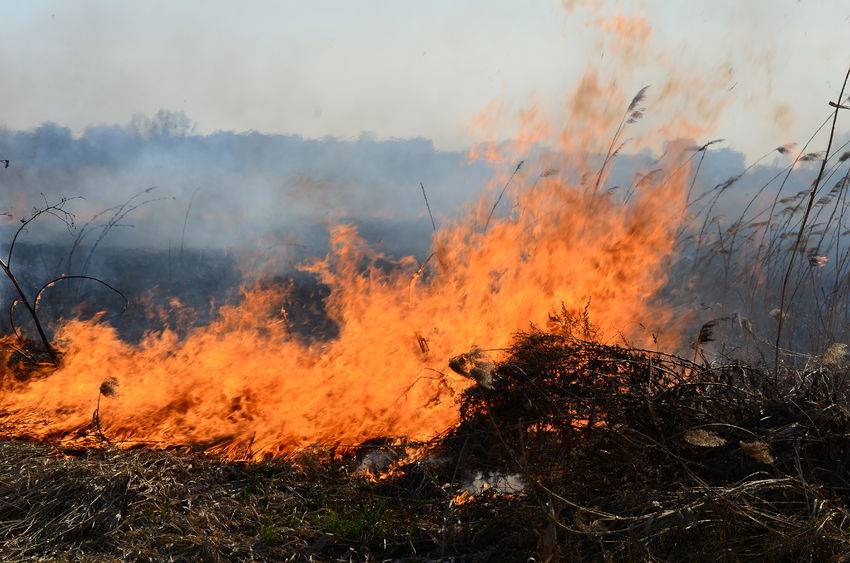
Concerns are increasing that the current record high February temperatures and dry countryside mean there is a high risk of moor and farm land fires.
The end of February has seen a rise in temperatures unusual for the time of year, with bright skies and dry weather.
The Met Office has recorded temperatures of over 20 degrees Celsius in some areas of the UK recently.
But this unprecedented warm dry winter weather is putting the British countryside at high risk of devastating fires, according to rural insurer NFU Mutual.
There are concerns of a higher risk of moor and farm land fires, putting lives at risk and costing millions of pounds in damage to farm animals, wildlife, buildings and machinery.
This week’s fires in areas such as Saddleworth Moor, near Manchester, Arthurs Seat close to Edinburgh, and the Long Mynd in Shropshire are 'stark warnings' of the damage fires can cause in dry conditions - even in winter.
An area around 1.5 square kilometres was left burning for days earlier this week on Saddleworth Moor, threatening nearby farms and buildings.
Fires at Arthur's Seat (Edinburgh), Saddleworth Moor (Manchester) and the inspiration for the 100 Acre Wood , Ashdown Forest (East Sussex).
— Amelia Womack ?????????????? (@Amelia_Womack) February 27, 2019
It's February! Our countryside shouldn't be a tinderbox! pic.twitter.com/6tFxbQcp7M
West Yorkshire Fire and Rescue Service Dale Gardiner said: “While we have not yet determined a cause of the fire, this is amongst the biggest moorland fires we have had to deal with in recent years.
“Wildfires are not generally common in February, so the above average weather conditions has elevated the wildfire risk across the county.
“Generally the summer months are our busiest times for wildfire, however due to the warmth we’re experiencing now, we feel it’s a good idea to remind the public of some steps they can take to stop this sort of thing happening.”
Dramatic pictures of the huge fire on Saddleworth Moor. https://t.co/XngAN6ZwA4 pic.twitter.com/ZCtk8a6yed
— BBC North West (@BBCNWT) February 27, 2019
In East Sussex, farm machinery helped stop thirty-foot flames from spreading as firefighters tackled infernos affecting 35 hectares of woodland in Nutley and Ashdown Forest.
Tim Price, NFU Mutual Rural Affairs Specialist, said: “In many parts of the country, it’s been the warmest February on record and the land is so dry that discarded matches and cigarette ends thrown down from cars can easily start a fire.
“While the record temperatures are forecast to end soon, the countryside looks set to remain unseasonably dry and at risk of fire.”
With the devastating #wildfires spreading across Marsden Moor here's our advice to NFU members on how to reduce the risk of on #farm fires and wildfires - https://t.co/vdNnfflUzg pic.twitter.com/aI2QnBvfJJ
— National Farmers Union (@NFUtweets) February 27, 2019
All the blazes came on the same day the UK recorded its highest ever winter temperature of 21.2C in Kew Gardens, west London.
The incidents follow last year's tinder dry conditions caused by the prolonged heatwave in summer.
Farmers on moors ravaged by wildfires last year faced bills running into tens of thousands of pounds after around 5,000 acres of their land was turned into a ‘black desert’.
Farm fire checklist
Fire prevention:
• Ensure there are sufficient fire extinguishers for the size of buildings and that materials stored are inspected and regularly maintained
• Ensure staff and adult family members know the location of fire extinguishers and how to use them
• Reduce the risk of arson by fencing-off straw stacks and farm buildings
• Store hay and straw at least 10m from other buildings
• Put in place an evacuation plan for staff and livestock
• Store petrol, diesel and other fuels in secure areas
• Schedule regular electrical safety checks
• Invite your local fire and rescue service to visit to check water supplies and access routes
If a fire breaks out:
• Call the Fire and Rescue Service without delay
• If possible, send someone to the farm entrance to direct the Fire and Rescue Service to the fire to help save time.
• Prepare to evacuate livestock should the fire spread
• Prepare to use your farm machinery to assist the Fire and Rescue Service
